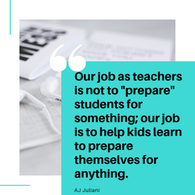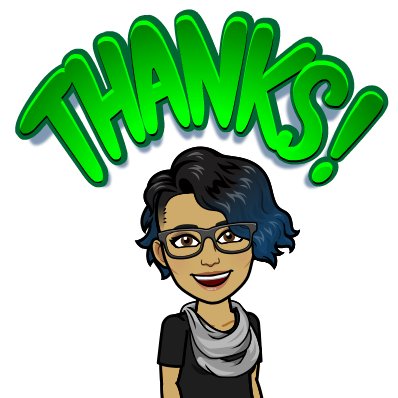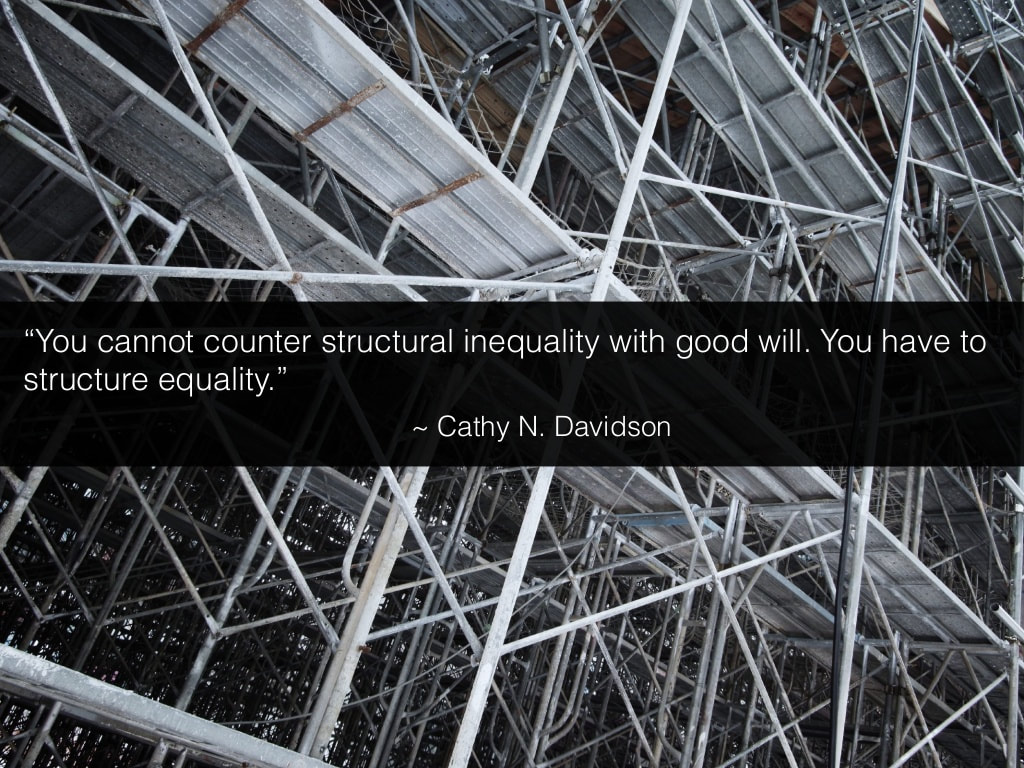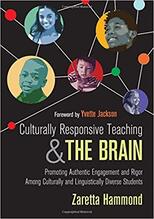|
Day 2 at InnEdCO19! Keeping with my organization for yesterday's post, I decided to reflect upon the themes of instructional strategies, new tech tools, and questions I'm thinking about. I want to note that I intentionally put instructional strategies before tech tools. I do this because I think these to be the most helpful, equity-focused information to be gained at InnEdCO. Not every school, teacher, district, etc has access to an increasingly long list of paid tools. However, they do have access to strong instructional strategies and good pedagogy that they can incorporate using whatever tools they already have access to in their classroom.
Instructional Strategies
Collaborative Annotation
Using a tool like Hypothes.is, Scrible, or just Google Docs, students can all annotate the same source of text - generating more learning and deeper conversation. This makes reading a social activity, with opportunities for students to gain insight and support from their peers. Have a class of ELLs? Students can comment on words they know or check to see if their interpretation of a statement is correct. Students don't have to wait until the end of an article to receive feedback from their peers, allowing them to more fully engage in the article.
Curation, Remixing, and Parody as Production
Using just about any platform, how can we provide students the opportunity to curate articles, videos, podcasts, etc? I think about how I used to curate YouTube playlists as support for my AP Calc students. Even though students might not be making the original content, the gathering of materials is a kind of production in and of itself, requiring a keen eye and critical thinking skills. I also think about how students can remix or create a parody of existing content in a way that demonstrates deep understanding and analysis of the original source materials. I think about my love of the podcast Buffering the Vampire Slayer and how the song at the end of each episode demonstrates deep understanding of the Buffy Universe. Top New Tech Tools
Check Mark Extension
Providing feedback to students on a Google Doc? Tired of copying and pasting the same feedback over and over again? Check Mark Extension stores your most common feedback, sorted by class so you can easily use it when examining student work. 
Anchor
I've been wanting to play with Anchor for a while - this podcasting tool add a social element to podcasts that didn't previously exist. Since I'm a total podcast junkie (previous blog post here), I think it's time that I dig in and finally use this application for its full potential power. Questions I'm thinking About
0 Comments
Today I had the pleasure of attending Day 1 of InnEdCO19 for the Leadership Conference. I was able to attend a handful of sessions (some in-person and some virtually through their linked resources). Instead of my normal session by session sharing, today felt belt processed through three themes: instruction, tech tools, and Critical Digital Pedagogy. Below are my highlights from each of these three areas.
New Instructional Strategy
I saw this video highlighting the strategy Talk Detectives in the Get Them Communicating session materials. I fell in love with the simplicity and impact of this instructional move, especially in supporting English Language Learners. In the age of standardized testing and data-driven instruction, discussion skills can get tossed to the side. This is a great way to ensure students know how to engage in productive academic conversations that lead to learning and is well-aligned with sociocultural learning theory.
New Tech Tools
Below are two tools I had not learned about before today (shout out to the Get Them Communicating and A Tool Parade sessions). Each offer a unique opportunity for supporting student learning.

kialo
This platform has a ton of great prompts and a structure for supporting student debates. With a first glance at their privacy policy, data is only used to support their product, making it a tool worth considering. I think this site can provide teachers with inspiring debate prompts to use in the platform of their choice. 
Twine
This open-source tool has a web-based version that allows students to create choose-your-own-adventure stories. This tool has a bit of a learning curve, but offers a free, no-account-needed solution to teachers wanting to support students with a unique writing project. Critical Digital Pedagogy
Today's conference opened with a keynote from Jesse Stommel and Sean Michael Morris, focusing on Critical Digital Pedagogy. I was able to engage in a conversation over Twitter on how we use Critical Digital Pedagogy to look at systemic inequities in our education system. Jesse shared this presentation with me from a previous keynote he gave at WILU2019, The Workshop for Instruction in Library Use. Below is the Twitter conversation, along with my favorite quote from the slides shared.
Jesse and Sean also offered a follow-up session, focused on applying the following questions to the tech tools we use with students. Below are the questions to consider when thinking about implementing a specific tech tool in the classroom.
What are your Day 1 InnEdCO19 highlights? Share them in the comments below!
I have been fortunate enough to spend the past two years coaching and learning with teachers implementing a school-wide 1:1 device program at an urban traditional high school. Grounded in the SAMR framework and the 4Cs, I helped teachers with a wide variety of instructional strategies - from setting up a Schoology grade book to planning for Project-Based Learning. Below are the tech tools I used most frequently with teachers to start them on their instructional technology journey. Pear Deck
There are several fancy features that come with the premium version (I absolutely love it), but the free version is still worth using. It is clear that teachers created this tool, based upon how user-friendly and intuitive it is. Pear Deck has this incredibly helpful guide and wonderful YouTube Channel to support teachers on top of built-in helper text as you use the tool. When it came to coaching teachers on technology, this tool had a low learning curve with an incredibly high impact on instruction. If you have a teacher new to using technology, this tool is a great one to start with in your coaching work. Screencastify
Students can record presentations, music playing tests, explanations of math problems, or anything else that is a combination of webcam, desktop screen, and basic annotation tools. This tool is incredibly powerful for all students, but especially supportive for English Language Learners - giving them a great tool to practice speaking skills. Connected to their Google accounts, students can click to record and then share the link to their video file. The tutorial site is complete with easy-to-use videos and ideas for classroom implementation. From a leadership perspective, this tool is also great for creating easy tutorials, sharing school-wide announcements, and avoiding informational whole-staff meetings. Google Sites
The power of Google Sites comes in its functionality - because it is a Google product it integrates well with other Google products such as Drive, Docs, Slides, Sheets, MyMaps, and YouTube. Sites are a great way to support students with blogging, organizing information from a research project, or creating a product of their learning. What are your top tech tool recommendations? Leave them in the comments below!
It is no secret to those that know me that I am very passionate about equity work as it relates to education. I have helped create a hybrid bias and equity year-long course, reflected on conference sessions and presentations, and engaged in countless conversations related to the inequities that plague our educational system. You can find my previous blog posts below.
While engaging in professional conversations and attending professional development around equity is valuable, I have found the impact to be limited. I believe that the hardest and most important work we can do as educators is pursue personal growth and education as it relates to issues of equity, inclusion, anti-racism, culturally responsive education, etc. This requires us to immerse ourselves in these topics on a regular basis - examining our identities, biases, complexes, blind spots, and fragility. It is never-ending work requiring intense study. Before I share some of the work I've personally engaged in, I want to name that I come to this work as a complex mash-up. I am a mixed, racially-ambiguous-looking, queer person who uses she/her pronouns. I took the last name of my spouse and co-parent a tiny human made with the help of science. Much of my family lineage has benefitted from systems of white supremacy and other parts have been oppressed by these same systems. My growth is incomplete and imperfect. I know I will not get everything right and I will continuously mess up. I am actually quite nervous to write this post because I know I still carry many biases and still have so much work to do. I am not an expert by any means. The work is hard and vulnerable, but I also know that for me to continue growing - reflecting and sharing my journey is necessary. As someone who struggles to read books on a regular basis (for a variety of reasons), I have found short articles, videos, and podcasts to be my main mediums for personal study. Luckily, I have also been able to participate in book studies and other formal professional development related to this work. I find colleagues, family, and friends to process my learning with and engage in deep, difficult conversations. I take time to internally reflect on my learning and try to practice awareness and speak up as often as I can manage. It is exhausting. There are some weeks that I have to take a break - but I always come back and dive in again. Below are some of the resources that have impacted me the most.
White Supremacy Culture Article by Tema Okun This article breaks down common organization cultural practices that are soaked in white supremacy culture. I find myself reflecting on meetings, interactions, and school cultures as it relates to this article all the time. Mostly, I find myself deeply concerned about the way schools feed into the 'Worship of the Written Word' element of this culture. Frequently, we do not count students as having mastered a topic unless they can write at grade level about it. Discussions, presentations, videos, and other non-written representations of understanding are seen as less valid or rigorous. This article gives me the words I've needed to engage in conversations to push back on this idea. This journey has greatly impacted me both professionally and personally. Between my work in public education and the complexity of my family background, I think about issues of equity ever single day. It's definitely changed me, pushing me to be a stronger advocate and solidifying elements of my personal identity. I know I still have a long way to go and I want to take this opportunity to reflect on some of the ways this work has impacted me in terms of awareness, advocacy, and identity.
There are a ton of personal experiences that have gone into shaping where I am at in this journey - it is likely I could dedicate and entire blog or write a book and still not capture everything. I hope that by sharing a glimpse into my story and this work I can inspire other educators to find the resources and community they need to either start or continue their own equity journey. Our students need stronger and better allies to overcome generations of systemic oppression. Unless we make a greater effort, we will continue to fail our historically underserved populations and perpetuate the inequities still seen in classrooms today. We can and must do better, but it take each of us sitting in discomfort and engaging in this work. To quote Brené Brown from her most recent Netflix special, “To not have the conversations because they make you uncomfortable, is the definition of privilege. Your comfort is not at the center of this discussion.” |
AuthorMattea Garcia is a human-centered problem-solver dedicated to improving learning and technology experiences. This blog is dedicated to reflections on leadership, educational technology, instructional coaching, educational equity, and more. Archives
June 2022
Categories |




 RSS Feed
RSS Feed
